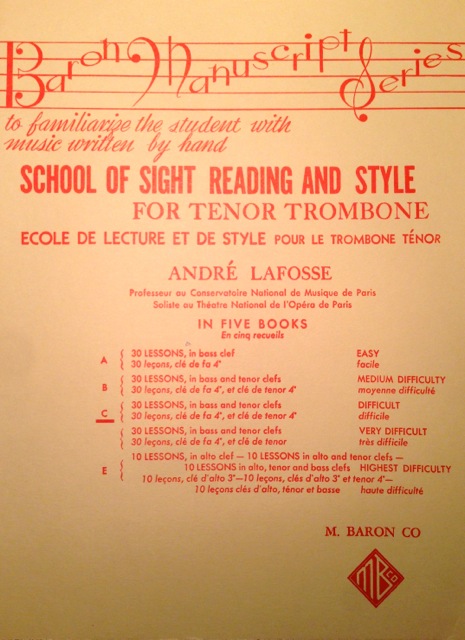Sight reading in 3...2...1...GO!
The topic of sight reading continues to rear its head in my teaching and discussions with colleagues. Notice I didn't say "ugly"! To me, sight reading is one of the most enjoyable musical experiences we can have. Sight reading a new piece can lend an air of excitement and the unexpected to times where we find ourselves playing the "same old, same old"! Sight reading is also a very trainable skill.
In my current job, I have a lot of opportunities to sight read. I often show up to a band commitment or a brass quintet performance and am required to read new music. Especially on my longer days, the conductor may start pulling out pieces that don't get performed often, or that are new to most of us. How does one go about becoming a better sight reader?!?!
First and foremost, and quite obviously, you must actually practice sight reading. "No joke!", you say. This is one of those skills that gets talked about, and most people know how to do, but few rarely ever actually work on it! It is also a skill that I feel most musicians don't take seriously enough. When you need it, you really need it!
There are a few avenues of approach here... If you are getting ready for a band or orchestra audition, then the most helpful thing is to go to your school's music library and ask for 2 or 3 pieces at a time to take out and read through... The more music you know, the better your chances of successful sight reading on a job or audition. As the old saying goes, "the best way to get better at sight reading is to never have to sight read!"
Now, most music librarians and band directors may be hesitant to let someone walk off with original ensemble parts to which they have no replacement... So, ask them if you might copy a page or two out of each part for practice purposes. This often keeps the library from getting into trouble regarding copyright and reproduction of complete parts. You should pull standard band pieces, marches, anything you can think of! Sit down with the parts and look them over thoroughly before you read them. Go slowly and really try to get an idea in your mind of what the piece is going to sound like. In an audition, you won't have that much time, but through practice, you will get better and faster at this initial scan of the music. Next, play the piece. Go slower than marked as needed, and don't feel like you have to play every little part. Play the big important sections. Record your initial attempt and listen back. Listen for: rhythmic accuracy, confidence, and tone quality. Remember, sight reading is not about perfection! It is about projecting confidence to your listener that you know the music you are playing reasonably well. Second, your time and ability to "stick with it" tells your listener that you have good fundamental skills, and that difficult passages won't get you rattled and cause you to implode and stop. That is undesirable as a soloist, but disastrous when you are sight reading within an ensemble.
For trombonists, I can't recommend the old Andre Lafosse School of Sight Reading and Style étude books enough.  There are five volumes, A through E, with E getting ridiculously hard! My teacher throughout my high school years used to plop one of those on the music stand and have me play them in lessons. The manuscript is terrible and the clef changes are frequent and non-traditional. They are a great tool to train your reading brain.
There are five volumes, A through E, with E getting ridiculously hard! My teacher throughout my high school years used to plop one of those on the music stand and have me play them in lessons. The manuscript is terrible and the clef changes are frequent and non-traditional. They are a great tool to train your reading brain.
Sight reading can be an enjoyable and very rewarding part of your musical life. If you have professional aspirations, it is an extremely important part of your bag of tools. Regular practice and use of the right tools will go a long way towards preparing you to be ready for anything!
Yours virtually,
Chris
